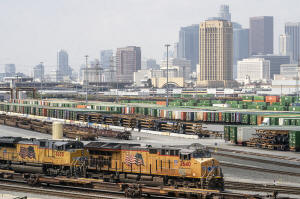Union Pacific and Norfolk seek 1st transcontinental railroad through a
massive merger
[July 30, 2025] By
JOSH FUNK
OMAHA, Neb. (AP) — Union Pacific wants to buy Norfolk Southern in a $85
billion deal that would create the first transcontinental railroad in
the U.S, potentially triggering a final wave of rail mergers across the
country.
The proposed merger, announced Tuesday, would marry Union Pacific’s vast
rail network in the West with Norfolk’s rails that snake across the
Eastern United States. The combined railroad would include more than
50,000 miles of track in 43 states with connections to major ports on
both coasts.
The nation was first linked by rail in 1869, when a golden railroad
spike was driven in Utah to symbolize the connection of East and West
Coasts. Yet no single entity has controlled that coast-to-coast passage.
The railroads argue a merger would streamline deliveries of raw
materials and goods nationwide by eliminating delays when shipments are
handed off between railroads. The AP first reported the merger talks
earlier this month a week before the railroads confirmed the discussions
last week.
Any deal would be closely scrutinized by antitrust regulators that have
set a very high bar for railroad deals after previous consolidation in
the industry led to massive backups and snarled traffic.
But Union Pacific CEO Jim Vena, who would lead the combined company,
said the expanded railroad will more seamlessly get lumber from the
Pacific Northwest, plastics from the Gulf and steel from Pittsburgh to
their destinations. And he promised to avoid past merger mistakes.

“It’s great for America,” Vena said. “We’re going to be able to move
products quicker, faster, more efficiently, better service, better for
our customers in that we are going to be able to give them a product
that allows them to win in the marketplace.”
Rail deal would have broad impact
If the deal is approved, the two remaining major American railroads —
BNSF and CSX — will face competitive pressure to merge as well. The
continent’s two other major railroads — Canadian National and CPKC — may
also get involved. The Canadian rails span all of that nation and cross
parts of America. CPKC rails stretch south into Mexico.
Some of the benefits of the deal should trickle down to consumers if the
railroads are able to streamline shipments because that will help keep
costs down, said Edward Jones analyst Jeff Windau. But, he said, "there
is that potential that there’s going to be some service disruptions.”
The American Chemistry Council said the major chemical makers it
represents have serious concerns that the deal could reduce rail
competition, but other shippers like Amazon and UPS may see benefits of
potentially faster, more reliable delivery. They, along with unions and
affected communities, will have a chance to weigh in before the U.S.
Surface Transportation Board.
The nation's largest rail union, SMART-TD, quickly opposed the merger
over concerns of jeopardizing progress that Norfolk Southern has made in
safety and labor relations since its disastrous 2023 derailment in East
Palestine, Ohio. The union said that Union Pacific's record is troubling
on safety, and treatment of workers. The smaller Transport Workers Union
echoed those concerns saying the deal would deliver “billions for Wall
Street while workers get shafted.” Several other major rail unions said
they are also concerned but want to meet with management first before
weighing in on the deal.
Railroads optimistic about chances for approval
There’s speculation that this deal might win approval under President
Donald Trump's pro-business administration, but the STB is currently
evenly split between two Republicans and two Democrats. The board is led
by a Republican, and Trump will appoint a fifth member before this deal
will be considered.

Norfolk Southern CEO Mark George said the “stars are aligned” right now
for this deal with railroads that have a lot of connections, and the
ongoing expansion of domestic manufacturing. “Then on top of that,
you’ve got a political situation where the administration and the STB
have both changed to maybe be a little more open minded to combinations
that help the country grow,” he said.
CFRA Research analyst Emily Nasseff Mitsch thinks the odds favor
approval though the deal will face intense scrutiny.
Union Pacific is offering $20 billion cash and one share of its stock to
complete the deal. Norfolk Southern shareholders would receive one UP
share and $88.82 in cash for each one of their shares as part of the
deal that values NS at roughly $320 per share. Norfolk Southern closed
at just over $260 a share earlier this month before the first reports
emerged speculating about the deal that includes a $2.5 billion breakup
fee.
[to top of second column] |

Los Angeles skyline is seen above the Union Pacific LATC Intermodal
Terminal is seen on Tuesday, April 25, 2023 in Los Angeles. (AP
Photo/Damian Dovarganes, File)
 Shares of both railroads fell more
than 2% Tuesday after the deal was announced, but Norfolk Southern
was down more than 3%.
More consolidation could follow
U.S. railroads have already undergone extensive consolidation since
the industry was deregulated. There were more than 30 major freight
railroads in the early 1980s. Today, there are only six major, or
Class 1, railroads.
Western rival BNSF, owned by Berkshire Hathaway, has the war chest
to pursue an acquisition of CSX, to the east, if it chooses. CEO
Warren Buffett is sitting on more than $348 billion cash and the
consummate dealmaker may want to swing for the fences one last time
before stepping down at year's end, as planned.
Buffett downplayed reports that he had enlisted Goldman Sachs to
advise him on a potential rail deal, but he rarely uses investment
bankers anyway. Buffett reached an agreement to buy the parts of the
BNSF railroad he didn't already own for $26.3 billion in a meeting
with its CEO more than 15 years ago.
BMO Capital Markets analyst Fadi Chamoun said in a research note
that it's likely a second transcontinental railroad merger will
follow this announcement because it would be risky to remain
independent and try to compete.
History of problems after past rail mergers
Yet there’s widespread debate over whether a major rail merger would
be approved by the U.S. regulators, which have established a high
bar for consolidation in the crucial rail industry.
That’s largely due to the aftermath of industry consolidation nearly
30 years ago. A merger between Union Pacific and Southern Pacific in
1996 led to an extended period of snarled traffic on U.S. rails.
Three years later, Conrail was divvied up by Norfolk Southern and
CSX, creating serious backups in the East.
“We're committed to making sure that doesn't happen in this case,”
George said. He added that the railroads will spend the next two
years planning for a smooth integration before this deal might get
approved.

U.S. Senators Tammy Baldwin and Roger Marshall promptly sent a
letter Tuesday urging the STB to examine the merger closely because
they “are concerned that a merger of this magnitude would diminish
options for industry to transport goods, increase costs, create more
unreliable service for U.S. shippers, and reduce overall
competition.”
But CPKC merger was approved two years ago
Two years ago, the STB approved the first major rail merger in more
than two decades, allowing Canadian Pacific to acquire Kansas City
Southern for $31 billion to create the CPKC railroad.
There were compelling factors in that deal, however. For one, it was
the two smallest major freight railroads. The new railroad,
regulators reasoned, would benefit trade across North America.
Union Pacific and Norfolk Southern said they hope to get approval
for the deal by early 2027. They expect to eliminate $1 billion in
costs annually, and Vena said no union members should lose their
jobs but the workforce could still shrink through attrition. Revenue
is also expected to jump.
On Tuesday, Norfolk Southern reported a $768 million second-quarter
profit as volume grew 3%, up from $737 million a year ago. Results
were affected by insurance payments the East Palestine derailment
and restructuring.
Without the one-time factors, Norfolk Southern made $3.29 per share,
just shy of the $3.31 per share that Wall Street expected.
___
Associated Press writer Wyatte Grantham-Phillips contributed to this
report.
All contents © copyright 2025 Associated Press. All rights reserved
 |